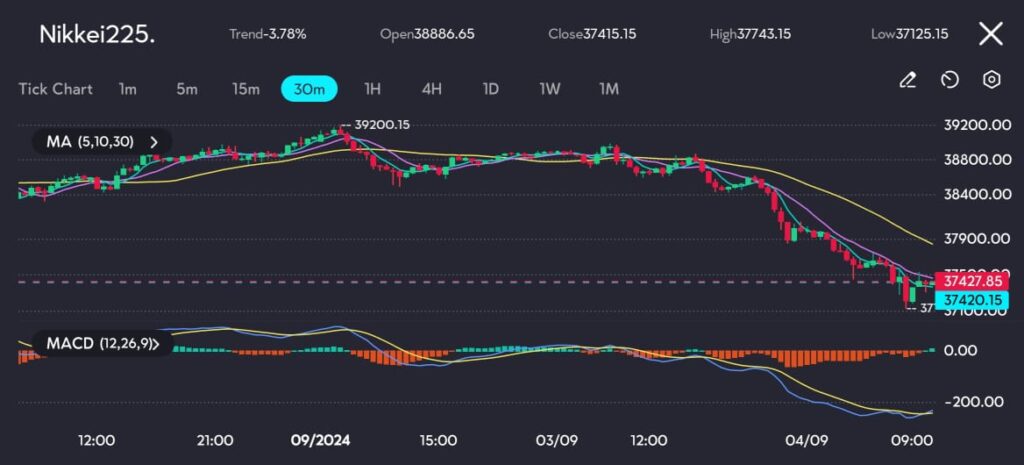Key points:
- The Nikkei dropped 3.3%, falling to 37,393.48, with chipmakers leading declines.
- Tokyo Electron fell 6.54%, while Advantest and Renesas lost 7% and 8.5%, respectively.
On Wednesday, Japan’s Nikkei 225 index dropped to its lowest point since mid-August, reflecting global market anxiety. The index fell by 3.3% to 37,393.48 by 0134 GMT, after initially dipping 4% earlier in the session.

See: Nikkei225 plunges as seen on the VT Markets app.
This decline comes amidst broader market weakness, which also saw the Topix index fall by 2.76% to 2,657.81. The sell-off has placed almost all sectors under pressure, reflecting widespread concerns in the market.
Looking at the charts, we see that the technical indicators are also painting a bearish picture. The MACD histogram has been deepening in negative territory, suggesting momentum is clearly in favor of the bears. The moving averages are sloping downward, with the shorter-term MA crossing below the longer-term one, indicating the potential for continued selling pressure.
Market participants are likely reacting to broader macroeconomic concerns, including potential global slowdowns and monetary policy uncertainties. For now, our analysts believe that the downward trajectory in the Nikkei may persist unless there is a major shift in either the domestic or global economic outlook.
Wall Street sell-off triggers market pullback ahead of key U.S. payroll data
This market pullback followed Wall Street’s biggest drop since early August, where major U.S. indices like the S&P 500, Nasdaq Composite, and Dow Jones Industrial Average all recorded substantial losses. The sell-off came as investors positioned themselves cautiously ahead of U.S. non-farm payrolls data, which will play a pivotal role in shaping expectations for future Federal Reserve interest rate moves.
Chip-related stocks in Japan were among the hardest hit, mirroring weakness in the U.S. tech sector. Tokyo Electron fell by 6.54%, closely following Nvidia’s 10% drop on Tuesday.
Peer company Advantest shed 7%, and Renesas Electronics was down 8.5%, becoming the biggest loser within the Nikkei. The slump in chip-related stocks reflects broader concerns about potential slowdowns in global technology demand, especially as high interest rates and economic uncertainty dampen growth prospects in key markets like the U.S.
You might be interested : Japan’s Nikkei falls after Wall Street’s tech stocks drop
Energy sector leads losses as Tokyo Stock Exchange sees broad sell-off
Energy stocks also experienced sharp declines, with the energy exploration sub-index falling 5.5%, making it the worst-performing sector on the Tokyo Stock Exchange. All 33 industry sub-indexes recorded losses, further underlining the broad-based nature of the sell-off.
Despite the negative sentiment, a few companies managed to buck the trend. Shares of Nitori Holdings, which imports materials for furniture and home interior goods, rose by 2.75%, supported by the strengthening yen. This contrasts with much of the broader market, where a stronger yen typically weighs on export-dependent companies.
Nikkei sees widespread declines as investors brace for U.S. economic slowdown
Of the 225 companies that make up the Nikkei, 212 stocks fell, while only 12 traded higher. One stock remained flat. The overwhelming number of declines highlights the cautious sentiment pervading markets, with investors on edge about potential U.S. economic slowdowns and the impact on global growth.
The broader market will likely remain sensitive to key economic data due later this week, including the much-anticipated U.S. non-farm payrolls report. The outcome of this report could influence Federal Reserve policy and determine the course of interest rates, which have played a central role in shaping market volatility in recent weeks. Investors will also be watching U.S. jobless claims data and job openings figures for further signs of economic health in the world’s largest economy.
Also read: S&P 500 wraps up August gains as rate cut decision looms
As uncertainty continues to grip markets, it’s possible that risk-averse trading will persist, particularly in sectors exposed to global demand cycles such as technology and energy. Meanwhile, defensive sectors and companies with positive internal developments, like Fuji Soft and Nitori Holdings, may continue to offer isolated pockets of resilience.
Start trading now — click here to create your live VT Markets account.







